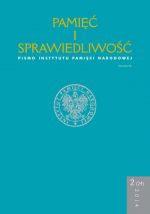Widmo imperiów: powracający z Gułagu a wschodnioeuropejskie rebelie i sowiecka polityka pogranicza
The Empires Pay a Visit: When Gulag Returnees Encountered East European Rebellions on the Soviet Western Frontier
Author(s): Amir WeinerSubject(s): History, Political history, Social history, Recent History (1900 till today), Post-War period (1950 - 1989)
Published by: Instytut Pamięci Narodowej
Keywords: Soviet western frontier; Gulag returnees; Hungary/Poland 1956; Secret Speech; Foreign radio broadcasts
Summary/Abstract: This essay explores the complex dynamic that fed Soviet anxieties over the border regions.This dynamic involved several interlocking aspects: the dismantling of the Gulag, including most notably the release of a significant number of convicted nationalist guerrillas and activists, who were allowed to return to their homes; the conflicting sentiments on the western frontier that led locals to embrace or reject the Gulag returnees based on pre-Soviet memories, the experiences of World War II, and postwar sovietization policies; the impact of the Polish and Hungarian upheavals, foreign radio broadcasts, and increased contacts with the outside world on the authorities and populations of the western republics; and finally, the attempt to counter these problems via the proliferation of communal surveillance and policing, therevival of class-based policies, and the intensified pursuit of ethnonational homogenization of the borderlands. The 1956 crisis raised several key questions for the post-Stalinist Soviet polity, especially on the western frontier: Why did a government as suspicious and seasoned as the Soviet regime consciously let a mass of sworn, unreformed enemies back into its midst? Was the era of social engineering over in the wake of the renunciation of mass terror and, if so, what came in its place? What were the boundaries of reform? What price was the regime willing to pay for the relative loss of control over information flow and communications? What accounted for the wide gap between a confident center and its weary periphery, and what role did the latter play in shaping national policies?
Journal: Pamięć i Sprawiedliwość.
- Issue Year: 24/2014
- Issue No: 2
- Page Range: 341-385
- Page Count: 45
- Language: Polish

